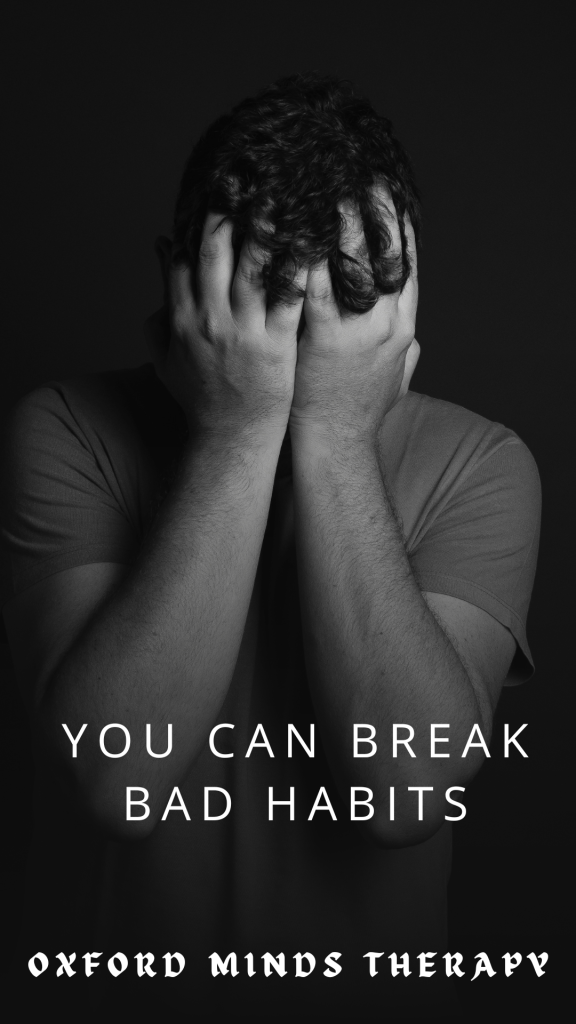Nail biting is a common behaviour that can stem from various factors, including deeply ingrained habits or emotional states such as anxiety, trauma, and depression. For some individuals, nail biting occurs unconsciously, while others are acutely aware of their actions but find it challenging to stop. This often arises from a perceived need to address imperfections in their nails, perpetuating the cycle of biting.
As a therapist at Oxford Minds Therapy, I understand that many behaviours and habits, including nail biting, originate from the unconscious mind. This part of our mindset governs our automatic reactions and ingrained habits, making it an ideal target for therapeutic interventions.

Hypnotherapy, a core aspect of neuro-linguistic programming, serves as a powerful tool for influencing the unconscious mind. By inducing a state of focused relaxation, hypnotherapy diminishes the activity of the conscious mind, creating an environment where suggestions can be more readily accepted. This process allows individuals to bypass the usual levels of analysis and filtering associated with wakefulness, making it easier to instil positive changes.
Book your Discovery Call here or contact me for a Quick Chat!
Phone: +447826 966828
WhatsApp: +447826 966828
Email: Victoria@PeopleBuilding.co.uk
The physical consequences of nail biting are often overlooked. Individuals who engage in this habit may experience sore fingers and bleeding, which can lead to further complications. The underside of our nails harbours numerous bacteria, particularly when hands have not been washed. One such bacterium, Staphylococcus, can cause various illnesses, including impetigo and toxic shock syndrome. Therefore, addressing nail biting is not merely a cosmetic concern but also a matter of health.
Moreover, nail biting can have detrimental effects on dental health. Although nails primarily comprise keratin—the same substance found in hair—the force exerted while biting can lead to significant dental damage. It is essential to be mindful of this potential harm and prioritise the health of one’s teeth.
In my practice at Oxford Minds Therapy, combining hypnotherapy with behavioural modification strategies can be particularly effective in helping you quit nail biting. One successful method involves utilising suggestions that induce feelings of queasiness whenever fingers are brought close to the mouth. This technique not only acts as a deterrent but also heightens awareness of the habit, empowering individuals to make conscious choices about their behaviour.
In addition to addressing the habit of nail-biting, it is crucial to provide clients with alternative strategies for managing stress and anxiety, which may contribute to the behaviour. Techniques such as self-hypnosis can be invaluable in this regard. By learning self-hypnosis, you can develop the ability to induce relaxation independently, offering a healthy alternative to nail biting during moments of tension.
It is vital to recognise that the journey to overcoming nail biting is personal, and what works for one individual may not work for another. Therefore, a tailored approach that considers each client’s unique circumstances, emotional triggers, and mindset is essential.
In conclusion, nail biting is a multifaceted behaviour that can be effectively addressed through neuro-linguistic programming, hypnotherapy, and other therapeutic techniques. By targeting the unconscious mind and providing clients with tools to manage stress, anxiety, trauma, and depression, we can empower them to break free from this habit and promote overall well-being. If you or someone you know struggles with nail-biting, exploring Oxford Minds Therapy may provide the support needed to facilitate positive change.
Book your Discovery Call here or contact me for a Quick Chat!
Phone: +447826 966828
WhatsApp: +447826 966828
Email: Victoria@PeopleBuilding.co.uk
The original version of this article was written by Gemma Bailey, director of www.peoplebuilding.co.uk. It was republished and rebuilt with additional content by Victoria Waligo – People Building
